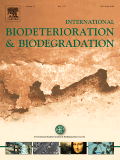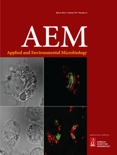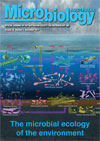
INTERNATIONAL BIODETERIORATION & BIODEGRADATION
Scope & Guideline
Leading the way in biomaterials and microbiology studies.
Introduction
Aims and Scopes
- Biodeterioration Mechanisms:
Researching the biological processes and mechanisms that lead to the deterioration of materials, especially in cultural heritage contexts, including the role of microorganisms in these processes. - Biodegradation of Pollutants:
Investigating the biodegradation processes of various pollutants, including plastics, pharmaceuticals, and industrial chemicals, and understanding the microbial pathways involved. - Microbial Ecology and Interactions:
Studying the ecological interactions among microbial communities in different environments, particularly in relation to biodegradation and biodeterioration. - Bioremediation Strategies:
Exploring innovative bioremediation techniques that utilize microorganisms or their enzymes to clean up contaminated environments, focusing on efficiency and sustainability. - Material Preservation Techniques:
Developing and evaluating methods for the preservation of materials, especially in cultural heritage, against biodeterioration, including the use of biocides and alternative treatments.
Trending and Emerging
- Microbial Plastic Degradation:
A significant increase in studies focusing on the biodegradation of various plastics, including bioplastics, reflects the growing concern over plastic pollution and the search for microbial solutions. - Sustainable Bioremediation Techniques:
Emerging research on sustainable bioremediation strategies, including the use of genetically engineered microorganisms and biostimulation techniques, is gaining traction as industries seek greener solutions. - Bioinformatics and Genomics in Biodegradation:
The integration of bioinformatics and genomics into biodegradation studies is on the rise, enabling a better understanding of microbial pathways and enhancing biodegradation efficiency. - Microbial Interactions in Biodegradation:
A growing focus on the interactions between different microbial species during biodegradation processes highlights the complexity of these systems and their potential for enhanced bioremediation. - Innovative Preservation Methods:
Research into novel methods for preserving cultural heritage materials against biodeterioration, including the use of natural biocides and advanced materials, is emerging as a significant trend.
Declining or Waning
- Conventional Biocide Applications:
There has been a noticeable reduction in studies focusing solely on traditional biocide applications for controlling biodeterioration, as the field shifts towards more sustainable and eco-friendly alternatives. - Chemical Analysis of Biodeterioration:
Research centered on purely chemical assessments of biodeterioration processes is becoming less frequent, with a greater emphasis now on biological and ecological perspectives. - Historical Case Studies:
While still relevant, the number of publications focusing solely on historical case studies of biodeterioration has decreased, indicating a shift towards more experimental and innovative approaches.
Similar Journals

BIODEGRADATION
Unraveling the complexities of organic degradation for a sustainable future.BIODEGRADATION is a leading academic journal published by Springer that focuses on the interdisciplinary study of the degradation of organic compounds and its implications for environmental health and sustainability. Operating since 1990, BIODEGRADATION has established itself as a pivotal resource in the fields of bioengineering, environmental chemistry, environmental engineering, microbiology, and pollution management, currently ranking in the Q2 quartile across these categories as of 2023. With an ISSN of 0923-9820 and an E-ISSN of 1572-9729, the journal disseminates high-quality, peer-reviewed research, engaging both seasoned researchers and emerging scholars interested in the mechanisms and applications of biodegradation processes. While the journal operates under a subscription model, it continues to attract significant interest due to its comprehensive coverage of innovative methodologies and critical analysis of biodegradation pathways and their environmental significance. As a beacon in its field, BIODEGRADATION not only addresses contemporary issues in environmental science but also fosters academic conversation and collaboration amongst researchers globally, making it an indispensable asset for those dedicated to advancing sustainability practices.

JOURNAL OF BASIC MICROBIOLOGY
Exploring Innovations in Applied MicrobiologyJOURNAL OF BASIC MICROBIOLOGY is a premier publication in the field of microbiology, published by WILEY since 1985. With a significant presence in Germany, this journal encompasses a wide spectrum of research topics, focusing on applied microbiology and biotechnology as well as diverse areas within medicine. Holding a commendable Q2 ranking in both its categories for 2023, it plays a crucial role in disseminating innovative findings and methodologies to the community. Researchers will find it to be an essential platform for sharing high-quality work, where it currently stands at rank #47 in the applied microbiology and biotechnology category, representing the 63rd percentile among international journals. The JOURNAL OF BASIC MICROBIOLOGY caters to a growing audience of professionals and students, offering insights essential for advancement in microbiological research and its applications. While it does not currently offer an Open Access option, it remains an influential outlet for academic excellence, continuously contributing to the development of the field through its rigorous peer-reviewed articles.

WORLD JOURNAL OF MICROBIOLOGY & BIOTECHNOLOGY
Advancing the Frontiers of Microbial InnovationWORLD JOURNAL OF MICROBIOLOGY & BIOTECHNOLOGY, published by Springer, serves as a pivotal forum for advancing the fields of microbiology and biotechnology since its inception in 1990. Located in the Netherlands, this esteemed journal has secured a prominent position in the academic landscape, recognized for its strong impact factor and prestigious Q2 category rankings across disciplines such as Applied Microbiology, Biotechnology, and Physiological Sciences. Researchers and professionals utilize this journal to disseminate innovative findings and explore emerging technologies that are transforming the scientific landscape. With a robust submission rate and high visibility among the academic community, the journal fosters interdisciplinary collaboration, encouraging discussions that bridge gaps between theory and practical applications. As it converges into 2024, the WORLD JOURNAL OF MICROBIOLOGY & BIOTECHNOLOGY continues to be a vital resource for scholars aiming to enhance our understanding of microbial processes and biotechnological advances.

Chemosphere
Fostering interdisciplinary insights for a healthier planet.Chemosphere is a prestigious peer-reviewed journal published by PERGAMON-ELSEVIER SCIENCE LTD, focusing on a wide array of critical topics in the fields of Chemistry, Environmental Science, and Public Health. Since its inception in 1972, the journal has become a vital platform for disseminating groundbreaking research, consistently ranking in the Q1 quartile across multiple categories, including Environmental Chemistry, Health, Toxicology and Mutagenesis, and Pollution. Its esteemed position is underlined by its impressive Scopus rankings, with significant placement in leading subsectors such as Environmental Science and Medicine. Although Chemosphere currently does not offer Open Access options, it remains a valuable resource for researchers and professionals seeking to advance their understanding of chemical interactions and their environmental impacts. The journal serves as an essential asset for students and academics alike, parsing complex issues of pollution, health, and toxicology while fostering inter-disciplinary approaches to remedy global challenges in environmental sustainability.

APPLIED AND ENVIRONMENTAL MICROBIOLOGY
Driving Impactful Discoveries in Applied MicrobiologyApplied and Environmental Microbiology, published by the American Society for Microbiology, stands as a leading journal in the fields of applied microbiology and environmental science since its inception in 1976. With a prestigious Q1 quartile ranking across multiple categories including Applied Microbiology and Biotechnology, Ecology, and Food Science, this journal consistently disseminates high-impact research that drives innovation and advances our understanding of microbial interactions within our ecosystems and industries. As ranked by Scopus, it exhibits prominent rankings in various related fields, underscoring its critical role in shaping contemporary microbiological research. Researchers, professionals, and students alike can stay abreast of groundbreaking studies while contributing to a vast body of knowledge that spans diverse aspects of microbiology, biotechnology, and ecology, ultimately contributing to sustainable practices. Join the community of dedicated scholars and explore vital research findings that impact both environmental health and technological advancement.

ANTONIE VAN LEEUWENHOEK INTERNATIONAL JOURNAL OF GENERAL AND MOLECULAR MICROBIOLOGY
Fostering Collaborative Discoveries in Microbial ScienceANTONIE VAN LEEUWENHOEK INTERNATIONAL JOURNAL OF GENERAL AND MOLECULAR MICROBIOLOGY, published by Springer, is a vital resource for advancing research in the fields of microbiology and molecular biology. With its ISSN 0003-6072 and E-ISSN 1572-9699, this journal consistently focuses on cutting-edge studies and developments, providing a platform for the dissemination of knowledge that spans over its rich history from 1934 onwards. The journal holds an impressive reputation, ranked Q2 in Medicine (miscellaneous) and Q3 in both Microbiology and Molecular Biology for 2023, reflecting its significant contribution to the scientific community. Researchers and professionals from various disciplines rely on this journal for quality publications that address complex microbial interactions and molecular mechanisms. Although it currently does not provide open access options, its compelling research remains accessible through institutional subscriptions, allowing it to foster collaborative advancements in the ever-evolving landscape of microbiological sciences.

JOURNAL OF INDUSTRIAL MICROBIOLOGY & BIOTECHNOLOGY
Transforming Research into Real-World Biotechnological ApplicationsJOURNAL OF INDUSTRIAL MICROBIOLOGY & BIOTECHNOLOGY, published by Oxford University Press, is a vital resource for researchers and professionals actively engaged in the fields of applied microbiology, biotechnology, and bioengineering. With an ISSN of 1367-5435 and E-ISSN of 1476-5535, this journal has established itself as a leading platform for disseminating innovative research findings and advancing knowledge in industrial microbiology since its inception in 1996. As of 2023, it is classified in the Q2 quartile across multiple categories including Applied Microbiology and Biotechnology, Bioengineering, and Medicine, underscoring its significance in the academic community. Notably, it ranks 26th of 127 in Applied Microbiology and Biotechnology, placing it in the 79th percentile, indicative of its high impact and influence. Although it does not currently offer Open Access, it remains a key outlet for high-quality scholarly articles that align with the objectives of improving industrial practices through biotechnological applications. For those interested in the latest developments and methodologies within the realm of applied microbiology and biotechnology, this journal serves as an indispensable reference.

AMB Express
Connecting Researchers to Transformative Microbial DiscoveriesAMB Express is an esteemed open-access journal published by Springer, dedicated to the fields of Applied Microbiology and Biotechnology as well as Biophysics. Since its inception in 2011, the journal has played a pivotal role in disseminating cutting-edge research and advancements, particularly for the scientific community in Germany and beyond. With a notable impact factor and ranking in the top quartile of its categories, AMB Express is recognized for its contributions to the disciplines, ranking 29th in Biochemistry, Genetics and Molecular Biology and 37th in Applied Microbiology and Biotechnology, reflecting its commitment to high-quality scientific inquiry. Researchers, professionals, and students will find a wealth of knowledge within its pages, benefiting from a diverse array of articles that stimulate innovation and collaboration. As the journal continues its convergence from 2011 to 2024, it remains a vital source for anybody looking to stay at the forefront of microbiological and biotechnological studies.

Microbiology Australia
Unlocking the Potential of Microbial ResearchMicrobiology Australia is a prominent journal published by CSIRO PUBLISHING, focusing on the diverse and rapidly evolving field of microbiology. Since its transition to Open Access in 2021, it has broadened its accessibility, fostering greater dissemination of research findings among scholars and practitioners. The journal features a range of topics that are pivotal for understanding microbial systems in applied microbiology, medical microbiology, public health, and environmental applications. Despite its current categorization in the Q4 quartile across several categories, it remains an essential platform for emerging research and innovative methodologies. Researchers and professionals can benefit from the journal's commitment to enriching the global discourse on microbiological advancements. With its ISSN 1324-4272 and E-ISSN 2201-9189, Microbiology Australia caters to a wide audience in Australia and beyond, making significant strides in bridging the gap between research and practical applications in microbiology.

Microbiology Research
Pioneering Discoveries in Microbial ResearchMicrobiology Research, published by MDPI, stands as a pivotal open-access journal in the field of microbiology, having established its presence since 2010. Based in Switzerland, this journal strives to provide a platform for innovative research and cutting-edge findings in various branches of microbiology, including medical microbiology and molecular biology. With an impact factor that reflects its dedication to scholarly excellence, Microbiology Research is classified in the Q3 category for both microbiology and medical microbiology, and Q4 for molecular biology as of 2023, indicating its growing importance and outreach within these domains. The journal aims to foster discussion and collaboration among researchers, professionals, and students by presenting articles that cover a wide array of topics and methodologies in microbiological research. Leveraging its open-access model, Microbiology Research ensures that high-quality research is accessible to a global audience, thus facilitating the advancement of knowledge and innovation in the microbial sciences.